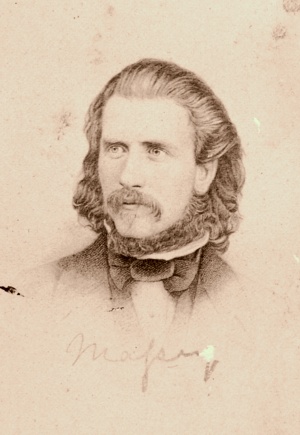Gerald Massey facts for kids
Gerald Massey (born May 29, 1828 – died October 29, 1907) was an English poet and writer. He was very interested in Spiritualism, which is a belief that the spirits of the dead can communicate with the living. He also wrote a lot about Ancient Egypt.
Contents
Early Life of Gerald Massey
Massey was born in England, near a town called Tring in Hertfordshire. His family was very poor. When he was just a child, he had to work hard in a silk factory. Later, he worked making straw braids, which was also very tough work.
His early years were difficult, with a lot of hardship. But Gerald worked hard to improve his life. He taught himself to read and write in his free time. He also developed a love for writing and literature.
Massey became interested in a movement called Christian socialism. This idea mixed Christian beliefs with socialist ideas about fairness for all people. He joined this movement with great energy. Through it, he met important thinkers like Frederick Denison Maurice and Charles Kingsley.
Later Life and Egyptology
Around 1870, Massey became very interested in Egyptology, which is the study of Ancient Egypt. He noticed that there were many similarities between ancient Egyptian mythology and the stories in the Gospels (parts of the Christian Bible).
He spent a lot of time studying Egyptian records. These records were kept at the British Museum in London. He worked closely with Dr. Samuel Birch, who was a curator there. Massey even learned hieroglyphics, the ancient Egyptian writing system. This was at a time when the Temple of Horus at Edfu was being discovered and explored for the first time.
Massey's Writing Career
Gerald Massey first became known as a writer when he edited a newspaper called the Spirit of Freedom. He was only 22 years old when he published his first book of poems. It was called Voices of Freedom and Lyrics of Love (1850).
He quickly published more poetry books, including:
- The Ballad of Babe Christabel (1854)
- War Waits (1855)
- Havelock's March (1860)
- A Tale of Eternity (1869)
In 1889, Massey released a two-volume collection of his poems called My Lyrical Life. He also wrote books about Spiritualism. He studied Shakespeare's sonnets and wrote about them in 1872 and 1890. He also wrote about religious ideas. Some people believe he was the inspiration for a character named Felix Holt in a famous novel by George Eliot.
Massey's poems were popular because they felt honest and strong. He wrote about the hero Richard Grenville before the famous poet Tennyson did. Tennyson himself praised Massey's work. He said Massey was a poet with great lyrical talent and a rich imagination. Massey's poetry was inspired by his travels, research, and experiences. He was a patriotic person who cared deeply about humanity. His poem "The Merry, Merry May" was even turned into a song in 1894.
When it came to Ancient Egypt, Massey published several important works. His first books were The Book of the Beginnings and The Natural Genesis. His most important work, Ancient Egypt: The Light of the World, was published just before he died.
Like another writer named Godfrey Higgins, Massey believed that many Western religions had their roots in ancient Egyptian beliefs.
One of Massey's most discussed ideas was his belief that there were similarities between Jesus and the Egyptian god Horus. He wrote about this mainly in his book The Natural Genesis (1883). For example, Massey suggested that both Horus and Jesus were born of virgins on December 25. He also claimed they both raised people from the dead. He even thought that the biblical Lazarus, raised by Jesus, was similar to an Egyptian figure called El-Asar-Us, a title for Osiris. Massey also believed both died by crucifixion and were resurrected three days later. These ideas have influenced later writers who explore similar topics.
Criticism of Massey's Ideas
Some scholars and theologians have criticized Massey's ideas. A Christian theologian named W. Ward Gasque contacted many leading Egyptologists. He wanted to know if they supported Massey's claims about connections between Egyptian and Judeo-Christian religions.
According to Gasque, most modern Egyptologists do not consider Massey's work to be important in their field. His work is not usually mentioned in major reference books like the Oxford Encyclopedia of Ancient Egypt. The Egyptologists Gasque spoke with generally disagreed with Massey's ideas about the origins of names like Jesus and Christ. One expert even called some of these comparisons "fringe nonsense."
However, some scholars, like biblical expert Thomas L. Thompson, have noted that there are indeed some parallels between Christianity and ancient Egypt.
Theologian Stanley E. Porter has pointed out that Massey's comparisons often contain historical mistakes. For example, Massey claimed that December 25 was chosen as Jesus's birthday because of Horus's birth. But the New Testament does not mention the date of Jesus's birth. The idea of December 25 came much later, around the 3rd century, based on other calculations.
Porter also noted that Massey claimed biblical references to Herod the Great were based on a myth. However, the existence of Herod the Great is well-proven by historical sources outside of the Bible. Porter states that Massey's serious historical errors often make his works confusing or incorrect.
See also
- Christ myth theory
- Tom Harpur
- Alvin Boyd Kuhn
- The Pagan Christ
 | Victor J. Glover |
 | Yvonne Cagle |
 | Jeanette Epps |
 | Bernard A. Harris Jr. |


